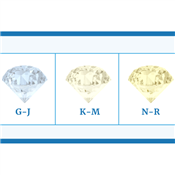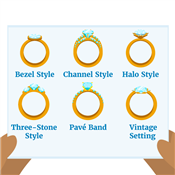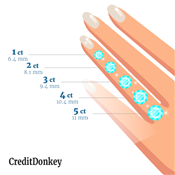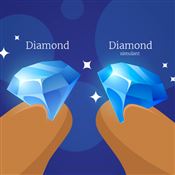White Gold vs Platinum
White gold and platinum may look similar, but they are very different when it comes to price, durability, and care. Read on to learn which is best for you.
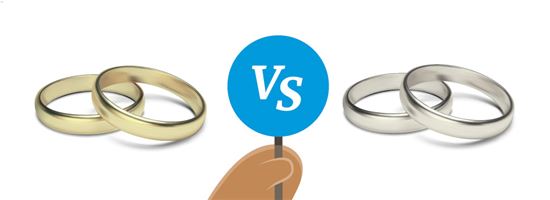 |
Finding the perfect engagement ring doesn't just stop with the right diamond and ring style. Which type of metal do you want to surround your gem?
If you love the cool, bright silver look, white gold and platinum are your top two choices.
Both are beautiful, sturdy metals. But both have their quirks. Find out which is better for you based on your budget, lifestyle, and even skin sensitivity.
What is Platinum?
Platinum is a naturally silvery-white metal. It's very dense and hard, making it ideal for jewelry.
It's a purer metal. Platinum jewelry is made with 950 platinum, which means 95% pure platinum and 5% alloys. This is why it's considered a premium metal and is pricier than silver and white gold.
Why choose platinum:
You have a skin sensitivity. Platinum is very durable and has a luxurious weighty feel. It's also hypoallergenic since it's a purer metal.
Why you wouldn't choose platinum:
You're on a tighter budget. Platinum is a lot more expensive than white gold. It also gets scratched more easily and needs frequent repolishing.
As with any jewelry, once it's been worn, the value drops. You can potentially sell an unwanted platinum ring to jewelers for scrap metal, and get close to market price.
What is White Gold?
White gold is not actually white. To get white gold, yellow gold is mixed with silver-colored alloys. Then it's dipped in rhodium to achieve the bright silver look. The alloys also make it strong enough for jewelry wear.
Most gold engagement rings are either 18k white gold (18 parts gold out of 24, or 75% gold), or 14k gold (58.3% gold). The more gold content, the more expensive it is.
Why choose white gold:
You're on a tighter budget. White gold is a lot more affordable than platinum, so it's better for couples on a budget. It's also more resistant to dents and scratches.
Why you wouldn't choose white gold:
You want a purer metal, or you have skin sensitivity. Nickel is usually mixed with gold, which can irritate skin.
White Gold vs Platinum Overview
First, here's a quick comparison between white gold and platinum.
| White Gold | Platinum | |
|---|---|---|
| Best for | Those on a budget | Those wanting a little luxury |
| Composition | Mixed with alloys; either 75% or 58.3% gold | 95% platinum 5% alloy metals |
| Price | More affordable | More expensive |
| Durability | More resistant to scratches | Very durable but soft; scratches more easily |
| Care | Need rhodium replating every couple of years | Need professional polishing to maintain the shine |
| Resizing | Easy to resize | Hard to resize |
| Sensitivity | The nickel content may cause skin allergies | Hypoallergenic |
| Weight | Lighter | Heavier |
| Finish | Shinier | low reflection point |
| Maintenance | Repolishing and re-plating with rhodium every 1-2 years | Frequent repolishing |
White Gold vs Platinum - In-Depth Comparison
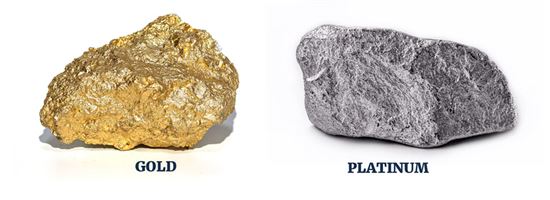 |
Let's get into the in-depth comparisons. To find the right choice for you, consider your budget, lifestyle, and how much maintenance you're willing to do.
Bottom line: White gold is more affordable and scratches less. Platinum holds diamonds more securely, but it requires more maintenance to stay shiny. But both are durable choices, so it's not necessary to splurge for platinum for durability alone.
White Gold vs Platinum Look
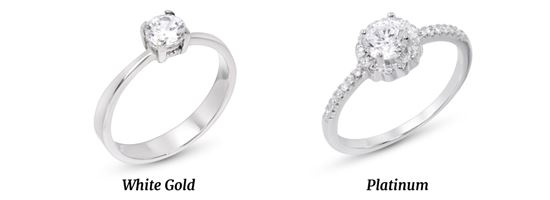 |
As you can see from the photo above, there's really no visible color difference between a white gold and platinum ring.
The difference is that platinum rings are naturally that silvery color. White gold is dipped in rhodium to get the bright silver color.
However, both metals require maintenance to maintain this color. Platinum will get dull, while the rhodium will wear off on white gold. We'll cover this later, so keep reading.
White Gold vs Platinum Price
White gold is a lot cheaper than platinum. For the same style ring, platinum can cost several hundred dollars more. This is one of the biggest reasons people choose white gold over platinum.
If cost is your biggest priority, then 14k white gold is the best choice. The two metals look almost identical, so there's no need to spend more for something that has no visual difference. You can put that money toward getting a better diamond or nicer setting instead.
Another cost to consider is the long-term maintenance costs. We'll go over it in a little bit, so keep reading.
Gold is more expensive per ounce. However, platinum rings cost a lot more than white gold rings. This is because platinum is a purer metal, whereas white gold is mixed with alloys. Platinum is also denser, so a platinum ring is a lot heavier.
White Gold vs Platinum Durability
Platinum is stronger than white gold, however, it is softer. White gold holds up better to scratches and dings, but the prongs are more likely to break in a direct hit.
Here is what you need to know about platinum and white gold durability.
White gold is more scratch-resistant.
A platinum ring will scratch more easily than white gold. Even though the metal is strong, it's soft and malleable. Since white gold is plated with rhodium, that makes the surface harder than platinum.
Platinum is less likely to break.
Platinum is very difficult to break or bend, so it will hold diamonds more securely in place. If there's a direct hit, the metal just bends slightly instead of breaking.
Compared to platinum, white gold is more brittle. The delicate prongs are more likely to break in a direct hit.
Platinum will not thin out; gold will.
When platinum gets scratched, the metal is only dented and not removed. During repolishing, the metal gets put back into place. A platinum ring will not wear down over time.
On the other hand, when white gold gets scratched, a tiny bit of the metal is lost. The ring does thin out over time with repolishing since metal is actually taken away.
The rhodium plating on white gold wears down over time. Generally, with normal daily wear, you will need to get it re-dipped every 2 years.
Maintenance & Long-term Care
Both platinum and white gold will need ongoing maintenance to keep them shiny and new. Platinum rings require frequent polishing, while white gold needs rhodium replating every couple of years. In general, platinum rings require more maintenance.
Here's what you need to know:
Platinum gets dull and needs polishing:
Because platinum gets scratched easily, it can become dull pretty fast. A lot of people are surprised to find that their beautiful, shiny platinum ring looks dull within just months.
As it gets more and more scratched up, platinum will develop a "patina finish"—a dull, gunmetal matte texture. This can make it look old, though some people like the "worn" feel.
Only professional polishing can make it shine like new again. Most people find that they need polishing every year (though the frequency depends on your wear and how much the patina bothers you).
White gold needs re-dipping:
White gold will remain shiny for longer even with scratches. However, the rhodium plating will wear down with normal activity and your body oils. Eventually, the pale yellowish color of white gold will start showing.
White gold needs to be re-dipped in rhodium every couple of years. This will restore it back to the bright silver color and make it look as good as new.
Check if your jeweler covers these services under their warranty, which many do. If not, expect to pay up to $60 for polishing and/or re-dipping.
Platinum rings will get scratched with daily wear. All the micro scratches will cause it to lose its shine and look dull. You will need professional repolishing to get it back to shiny like new again.
Skin Sensitivity
Platinum is the safest option if you have very sensitive skin. Since it's a purer metal (95% platinum), it won't cause any skin irritations. Platinum is the most hypoallergenic metal.
White gold is plated with rhodium, which doesn't cause any skin allergies. But as the rhodium wears off, your skin will come into contact with the gold/alloy mix.
White gold is mostly mixed with nickel, which is one of the most common metal allergies. That could start to irritate your skin. But you can avoid this problem if you are diligent about getting your white gold ring re-dipped.
Is White Gold or Platinum Better for You?
Still can't decide which one is better for you? Here are some final considerations:
| White Gold | Platinum | |
|---|---|---|
| Smaller budget | ✓ | |
| Very active with hands | ✓ | |
| Lots of small diamonds | ✓ | |
| Intricate details or engraving | ✓ | |
| Very sensitive skin | ✓ | |
| People with larger rings | ✓ |
- Budget: If you're on a tight budget, then 14k white gold is the most affordable option. (And if you haven't set a budget yet, be sure to check out our engagement ring budget calculator.)
- Lifestyle: If you're very active and knock your hands around a lot, platinum is the more durable choice. But just know that it'll get scratched up. For normal daily wear, white gold will hold up better to scratches and dings.
- Style of ring: Is your ring simple or has a lot of little diamonds? If it has lots of diamonds, platinum will hold the diamonds more securely in place. The same is true if you have a very high-set diamond that's easy to bang.
- Maintenance: Platinum requires more maintenance since most people need an annual polishing (or even more frequently if you really hate the patina). White gold needs re-dipping about once every 2 years.
If these services aren't covered by your jeweler, consider the ongoing care costs too.
Platinum vs Other Golds
If you're not set on a silver-colored ring, yellow gold or rose gold are also good options. The good news is that these metals don't require much maintenance.
Another pro point is that since these are warmer-toned rings, you can choose a diamond with a lower color grade (J or K). This will help you save a lot on the diamond.
Platinum vs yellow gold
Yellow gold is made with alloys such as copper, silver, and zinc to make the yellow color. Because it doesn't have rhodium plating, yellow gold is softer and more easily scratched. It's the softest metal, so it won't be a good choice for very active wearers.
Out of all the golds, yellow gold is the most hypoallergenic. There's not a lot of nickel or copper content that gives skin allergies.
Platinum vs rose gold
Rose gold is mixed with copper to give it the pretty pink color. Copper is a very hard metal, so this makes rose gold the strongest metal choice.
The downside is that copper can cause skin allergies in some people. The color can also change over time since copper oxidizes. But a lot of people enjoy the more antique look as the rose gold color darkens.
Where to Buy Platinum and White Gold Rings
Most jewelers will offer a selection of platinum and white gold rings.
We recommend browsing online retailers like James Allen first to get familiar with white gold and platinum ring prices.
James Allen lets you create your own ring in any metal. Plus, prices are up to 40% cheaper than physical jewelers.
Another retailer worth checking out is Blue Nile.
With an unbeatable selection and attractive prices, Blue Nile is a good choice for both platinum and white gold engagement rings and wedding bands.
Bottom Line
White gold and platinum are both beautiful, durable metals for an engagement ring. But both also have their trade-offs. The best choice for you depends on your priorities.
If maximizing budget is your biggest concern, then it's a no-brainer to go with white gold. It's a great balance of durability and price. White gold will also stay shinier longer.
If you want a ring to last for generations, platinum will be your best choice. It's more durable, but be prepared to deal with more scratches.
Anna G is a research director at CreditDonkey, a diamond jeweler comparison and reviews website. Write to Anna G at feedback@creditdonkey.com. Follow us on Twitter and Facebook for our latest posts.
Note: This website is made possible through financial relationships with some of the products and services mentioned on this site. We may receive compensation if you shop through links in our content. You do not have to use our links, but you help support CreditDonkey if you do.
|
|
| ||||||
|
|
|


